So you’re looking for the best platform to learn to code, and you’re not sure which to choose:
Coursera with its large catalogue and college certifications
Or Udemy with its cheap courses
Well, by the end of this Udemy vs Coursera guide, you'll know exactly which one is the better choice. We'll weigh the pros and cons of each, the pricing, and the unique features that they have (and the ones they're missing).
I'm also going to show you a 3rd option that you might not have heard of... Zero To Mastery, which you'll see is better than both Udemy and Coursera.
However, let's address the elephant in the room:
Since you're reading this on the Zero To Mastery blog, there's obviously some inherent bias, but I guarantee I won't BS you. I'll call out issues and downsides with all 3 platforms, ZTM included.
Still don't believe me?
Then go read some unfiltered reviews for yourself on the TrustPilot page for each option. (For better or worse, TrustPilot doesn't let any reviews be edited or deleted, so you can trust what you read).
Each of these scores is out of a possible 5 stars.
Pluralsight Trustpilot Reviews = 1.4... ouch!
Udemy Trustpilot Reviews = 1.7... better-ish?
Coursera Trustpilot Reviews = 1.5... there's a theme here 🤔
Codecademy Trustpilot Reviews = 2.7... wow!
Zero To Mastery Trustpilot Reviews = 4.9... we ain't perfect but we're trying our best over here!
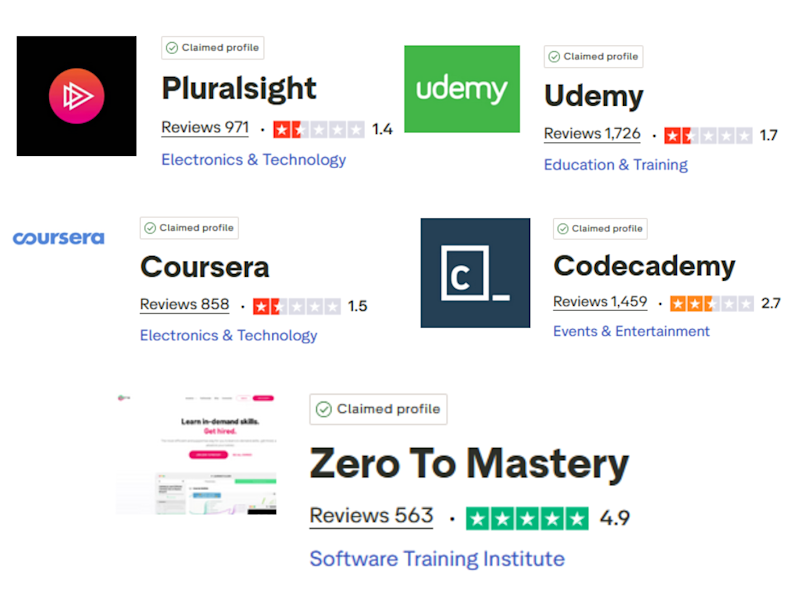
I threw in Codecademy and Pluralsight also, since those are typically other options people consider as well. Don't shoot the messenger. I'm not looking to bash anyone here, just providing the facts.
Mile-High Comparison
Before we get into the full breakdown, here's a quick side-by-side comparison for the skimmers in the audience.
Feature | Coursera | Udemy | Zero To Mastery |
|---|---|---|---|
Course library | 7,000 courses across multiple industries. Some are locked outside of the subscription for their college programs only | 200,000+ courses (A LOT on the exact same topic with 11,000+ Python courses alone, quality varies) | 142+ in-depth courses taught by 37 industry experts |
Course updates | Doesn't list if or when the courses have been updated | Some. However, quality control is weak, and instructors can “game” the update status with a small tweak, so they might not be up to date | Updated 1–2x per year per course. More often, if a major change occurs |
Learning paths/structure | Collections of courses around a role + certifications | Career Accelerators | Career paths, roadmaps, and structured progression |
Projects & hands-on learning | Varies. Some courses have projects available, but not all | Depends on the course and instructor; not guaranteed | All courses include multiple hands-on projects for portfolio building |
Can they help you get hired? | Interview prep courses. There is some argument for degrees helping at MAANG also | Thousands of interview prep courses, but no real structure | Strong focus on job prep, interview training, and portfolio building |
Online Community? | Old school forum | None (occasional per-course groups by instructors) | Active Discord community, accountability groups, live events |
Support | Yes, but 75% 1-star reviews that seem to be complaining about poor customer service | Hit or miss, depending on the instructor and scale | Direct human support + instructors + community |
Pricing | $59 a month or $399 a year. Degree pricing varies but can be anywhere from $20,000 to $40,000 | $10–$199 per course (lifetime), $12/month subscription (limited) | $49/month, $299/year, or $1,299 lifetime. We also offer a unique “Lifetime Challenge” (30 months of consistent learning = free lifetime access) |
TrustPilot rating | 1.5/5 | 1.7/5 | 4.9/5 |
Best for | Learners who want a college certification online | Bargain hunters who are willing to dig for quality | Learners who want structure, support, and a clear path to getting hired |
Alright, let's get into each of these.
Update! Less than a month after writing this guide, Coursera just announced plans to purchase Udemy.
The details are still pretty vague and it's not clear what will happen. If Udemy will still have the same platform and price, or if it will all go under the larger monthly fee at Coursera.
Also, it's not clear what will happen to the courses on there, or how this will impact the course creators. Either way, at the time of this news the rest of this guide is still accurate until any sweeping changes happen.
Coursera: Detailed Breakdown

Coursera is a unique option when compared to most training platforms, in that it’s directly affiliated with both prestigious universities and tech companies.
Cool right?
This means that:
Some of their content is created by a college and can help you get an online Bachelor's or Master's degree
Some courses are created by companies like IBM or Google on broader topics, such as an introduction to ChatGPT
And then you have tech experts who have built specific courses (most platforms work like this)

Because of this, their catalogue is huge, with currently over 7,000 courses and growing!
However, not all of these are tech-focused, so there will be a lot of stuff there that you’re probably not interested in, but that’s fine.

As for the course content itself, the depth can really vary.
Some courses are only an hour long, while the degree-level courses are 3 to 4 years long, and you can only join on specific dates.

Obviously, this really affects the price, so let’s get into it.
Pricing
There are a few different options with Coursera, depending on whether you’re an individual, a business with a team, or applying for a degree. Let's cover the 2 main ones that you'll probably care about.
The subscription starts at $59 a month or $399 a year if you pay in advance.

They do seem to run into pricing issues a lot, though, so make sure to check reviews. Both of these are the first reviews that come up, and that's just in the last week alone:

I’ve said this before, but it’s impossible to keep millions of customers happy, so you will see some issues like this. However, just be aware that this type of thing is happening.
As for their online degrees, the price for these is MUCH higher and can vary depending on the course. The CS degree I shared earlier is listed at $27,000, although they do have some scholarships and financing.
However, it should be said that you don’t really need a degree to get into a tech career, so I’m not sure if I would want to spend 4 years and $30k on this.
Wait, there’s no need for a degree?
Yep, that’s right…
Can they help you get hired?
The tech industry is unique to almost any other job in that you don’t need a degree to get hired. Companies care more about portfolio project examples and how you perform during the interview process.
Usually, this is staggered and features a series of tests to prove you can do what you say you can, and it’s also why Coursera has courses on how to pass the tech interview.

So yes, Coursera can help you get hired in this respect. Some platforms don't cover the interview, which is kind of crazy.
But as for the degree itself and getting hired?
It’s not really needed. It’s only the super large tech companies, such as Facebook or Google, that ask for this, and even then, they don’t always care about it.
(Here at ZTM, we’ve had people hired at these companies without a degree, solely based on their portfolio work and projects, but more on that later!)
Is there a community in Coursera?
Learning a new skill can be incredibly hard. You might be super motivated when you start out, but that motivation can dip over time. That’s why communities are so vital, because they help you get past problems, but also lower the chances that you will quit. Especially if you join with other members on the same course, and keep each other accountable.
Now obviously, if you take one of their degree courses, then you’re going to be interacting with other students and the teacher during those 4 years.
However, most people won’t take these, which is why Coursera also offers an old-school forum community for its subscription course members to post questions. Just be aware that due to the platform size and number of users, it’s not that active in each section.
For example
The image below is from their thread on generative AI, which is probably the biggest topic in tech right now. But even then, the last post was 18 days ago.

So yes there’s some support, it just might not be as active as you want though.
Reviews + Trustpilot score

Alright, let’s get the uncomfortable bit out of the way…
At the time of writing, Coursera is currently sitting at just 1.5 out of 5 stars on TrustPilot. It seems like this due to over 75% of their reviews being 1-star due to their billing practices.
To put that into context, that means that 709 out of 945 reviews are 1-star.
Again, I don’t want to throw shade on anyone because when you have that volume of members, and you run a free trial with card details required up front, then you’re going to get a lot of people who get charged before they cancel.
However, it seems like some others are frustrated that they join on a free trial and finish courses, but the certificates are locked and not sent until you transition into become a paying member:

I mean, I get it and they need to make money. But if a student smashed through 30 hours of content in 7 days and meets all the criteria, you should probably give it to them.
(I also imagine a student like that would be super grateful and stay a customer for their entire career, right?)
TL;DR
As you can see, there are a few great things and a few hiccups with Coursera.
Pros
$59 a month is fairly cheap and around average for platforms teaching cutting-edge tech
High-quality content
High-level teachers and expertise
Potential for college accreditation
Some community support
Cons
A HUGE volume of courses can be overwhelming
Certifications are locked behind a paid account
Community isn’t super active
Degrees are cheaper than going in person, but not always necessary
Seems to be a lot of issues with people being charged by accident
Customer support doesn't seem great
Udemy: Detailed Breakdown
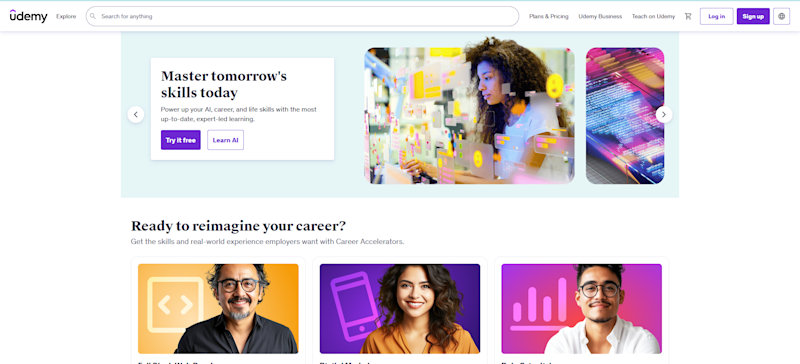
Udemy is an e-learning platform with millions of users. Thanks in part to its discounted pricing schemes.
It’s not a dedicated ‘tech training' platform, but it does feature a lot of tech courses.
This can be viewed as good or bad in that it's awesome to know you can find a course on pretty much any topic, but it can also be extremely overwhelming.
For example
When we search for Python courses, there are 27 on the first page. And then a whopping 417 pages of Python course results!
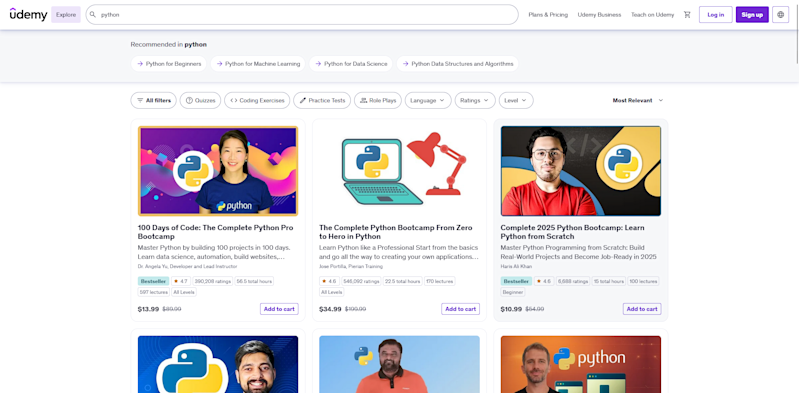
That’s 11,259 Python courses alone, with the majority of them on the exact same topic. In fact, of the 27 Python courses on page 1 of their results, 25 of them are focused on teaching Python to Beginners.
That's even more overwhelming!
Which do you pick?
The newest one?
The one with the most reviews?
Or just freak out and not pick any of them?
My best advice is to look for courses that are up to date, and then filter down from there.
I did see some courses were updated in the last few months, so that’s good. However, BE CAREFUL. This last updated field can be easily gamed by instructors, as we mentioned in our detailed Udemy review post.
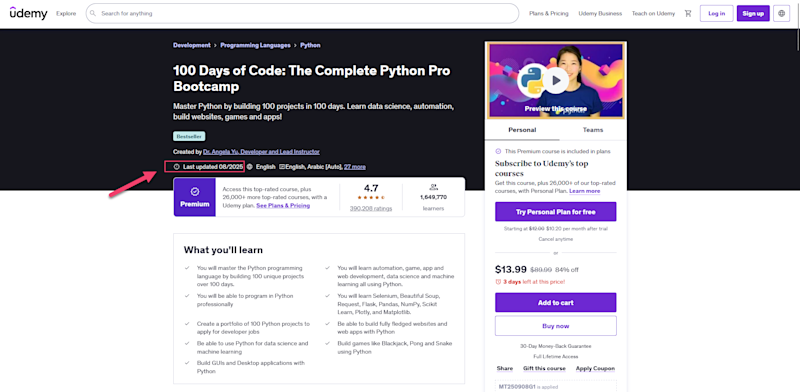
Since Udemy operates purely as a marketplace where literally anyone can post a course (it’s why they have millions of them), this does lead to a few issues:
There’s no real quality control. Since anyone can make a course on anything, it's impossible for Udemy to actually review courses itself. This leads to a lot of terrible courses (but also some incredible ones too, don't get me wrong!). On marketplaces, this is generally solved by ratings, but...
The ratings can be ‘gamified’ and are an imperfect system. Once a course gets a lot of sales and 5-star reviews, Udemy's marketing machine tends to continually promote that course, leading to more sales. Usually, one of the FIRST courses on a topic will end up being the most promoted and highest reviewed for a long time, regardless of whether it's actually been updated or is actually the best course
Speaking of updates. Udemy doesn't keep track of whether a course is actually updated. It uses an automated system. An instructor can just edit a text file to make the ‘last updated’ criteria trigger. (Such as tweaking a sentence and hitting save). So I recommend reading recent reviews and looking at the curriculum of similar courses from other learning platforms to make sure the Udemy course you're looking at is truly up-to-date
Stock Price & Revenue = #1. Udemy is a public company and for a few years now has been priortizing Enterprise customers over individuals (that's where the big money is) and has continually lowered the percentage that instructors earn per sale (makes them more money = stock price goes up) which has resulted in many instructors less incentivized and motivated to update their courses or answer student questions like they used to in the good old days
That being said, there are still some great courses on there at insanely low prices. Just be aware of these things and do lots of research, and read recent reviews before making a decision.
They also recently released roadmaps to certain careers called ‘Career Accelerators’:
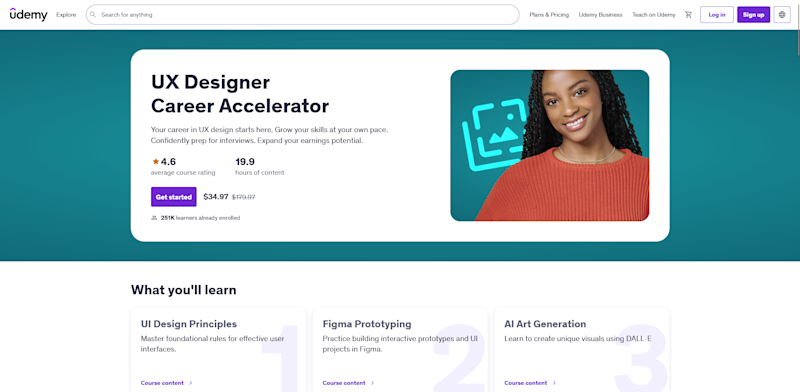
Just like with our own career paths at ZTM, these cover a series of courses to help you learn the core elements of a role (although I’m not sure AI art generation is a growing requirement in UX design, it's probably a good skill to have knowledge of).
Can they help you get hired?
They can!
Again though, they have 5,472 courses on how to pass the tech interview, including different specialties and programming languages, as well as different stages of the interview.

Gah!
However, some of the Career Accelerators do have specific recommended classes around getting hired based on that role (i.e. they cover JavaScript questions in the Web Dev Career Accelerator).
Pricing
This is where Udemy shines because almost all courses are constantly on some kind of deal, so you can absolutely grab a bargain.
Course prices will vary depending on what offers are live and based on your location (maybe try a VPN to see if you can get lower prices from elsewhere... try an IP in India 😉), but you’re typically looking at anywhere from $10 to $100 for some courses for lifetime access.
If it's going to cost you more than that, go find a deal or wait a couple of days for the same course to be 80% OFF.
They also have a membership pricing option at $12 a month, where you get access to a wide range of courses (but not all of them, because some instructors have opted out of being included).
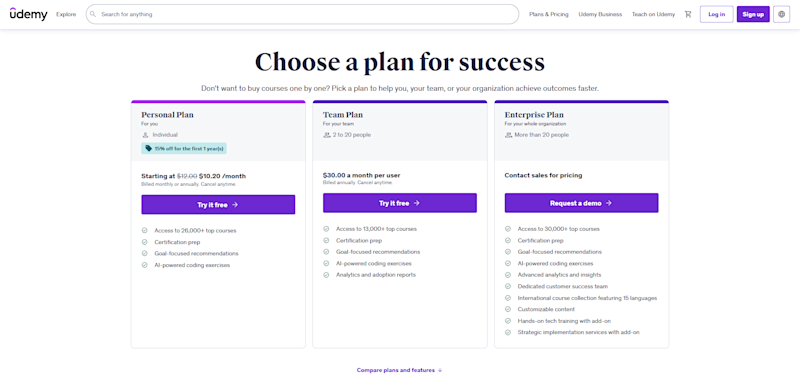
It's a pretty reasonable price, but given most people probably only ever need 3-15 courses, you might as well just spend $20 per course when you need it.
Is there a community?
No. There’s no community at Udemy, which is understandable given their size. Some instructors may offer this as part of their course, but this is becoming less common because instructors are making less money on the platform, which means they can't justify the time investment.
(I know I keep going on about the importance of a community, but you will struggle to work through the content without a support network).
In fact, there’s a common issue in tech called ‘Tutorial Hell’. It sounds ominous, but basically, it's a common problem where you’re self-taught via a platform like this, but you lack any structure or support.
Everything is fine at first, but what happens is:
You do X amount of a course
Stop
Come back
Get bored
Choose something else to learn
Etc
You end up bouncing around between topics (sometimes for years), learning unrelated things and not what you need to know to actually get hired.
It's a really common problem.
In fact, we get a lot of students who start on free or cheap platforms like Udemy (or YouTube or FreeCodeCamp) and then come switch to Zero To Mastery because we have that structure and support. Some of them struggle for years on topics, and then within months of learning with us and being part of our Discord community, they’re building their own projects and getting hired.
It’s a night-and-day difference in what a community can do for you and how fast it can accelerate your career.
Is there support?
Yes, but it can be hit and miss. Just like with Coursera, they’re a victim of their size and how many customers they have.
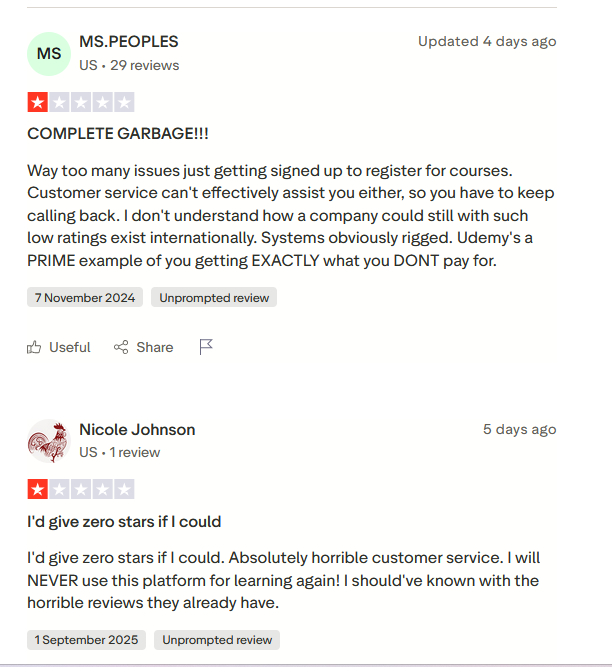
You can’t keep everyone happy. However, it does seem to be a pretty big trend with their reviews.
Speaking of which…
Reviews + TrustPilot score
Right now, Udemy is currently sitting at a 1.7 out of 5 across 1,718 reviews:
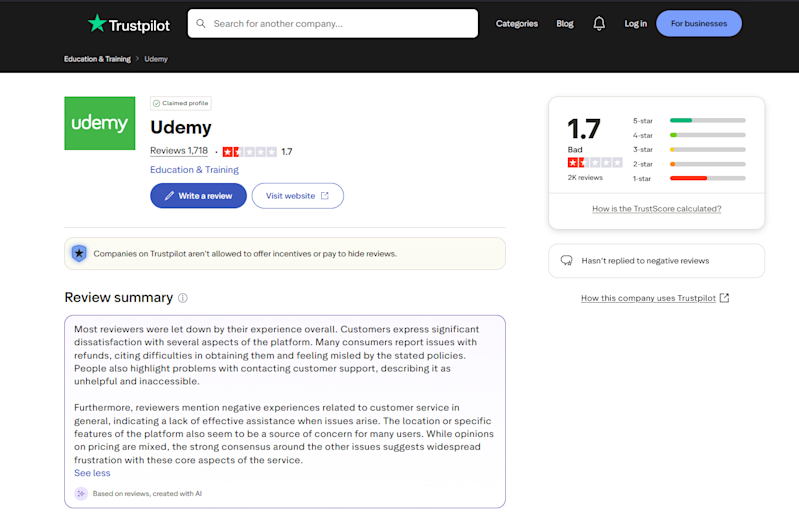
Again, with millions of members, you're bound to get some negative feedback. But considering 50% of their reviews are 1 star, you'd think they'd try and do more to resolve some of the issues and complaints people have. Or at least responding to some of the reviews.
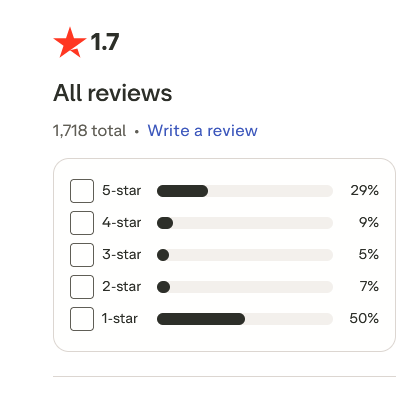
To put that into perspective, that's a higher segment than any of their other star ratings. (Although still a better percentage than Coursera).
That said, they have had some 5-star reviews in the past few months, so that’s a good indicator that not everyone is having a bad experience. Although users are frustrated with some of the billing issues and refunds (if you watch more than X of a course, you void the 30-day refund window, apparently).
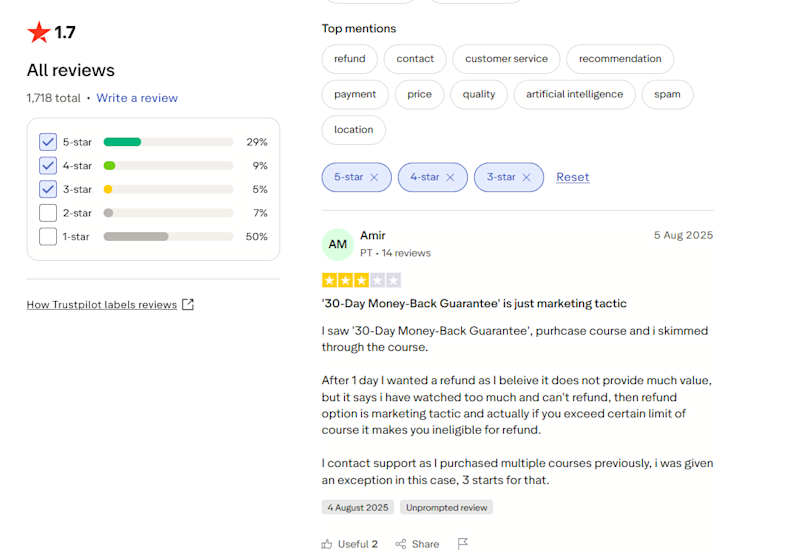
Again, don’t just listen to me.
Check out the reviews for yourself of the courses you're considering.
TL;DR
It can't be said enough that Udemy is the best option if price is the most important factor for you. Yes, you have to put in more work upfront to find the diamonds in the rough, but when you do, it's incredible value.
Just remember, you do run the risk of ‘getting what you pay for’.
Pros
A huge database of courses from pretty much every topic you can imagine
If you spend a lot of upfront time, you can still find some great quality courses for a super low price
Cons
The sheer volume of courses can be overwhelming and make it hard to figure out what's high-quality vs. not, up-to-date vs. not, etc.
There’s no community to help with accountability or to answer questions
Udemy does very little quality control. This means they can’t verify the course content is accurate, and they don’t check or push for course updates.
Content can be out of date, which can definitely be an issue when coding languages evolve or change versions, and is even more important with LLMs, AI, and AI tools, which are changing and evolving faster than ever
Ultimately, Udemy is a great place to find some high-quality training at a low price, as long as you’re willing to search through the results and maybe buy a handful of courses before you actually find one of the great ones.
But it also lacks some elements that can help you succeed when learning online, such as a community and support. However, if you're someone with a lot of self-discipline and organization, it can be a great place to start your coding journey.
But what if you want more accountability, structure, and systems in place to help you complete and finish your training?
Well, let me tell you about …
Zero To Mastery: Detailed Breakdown
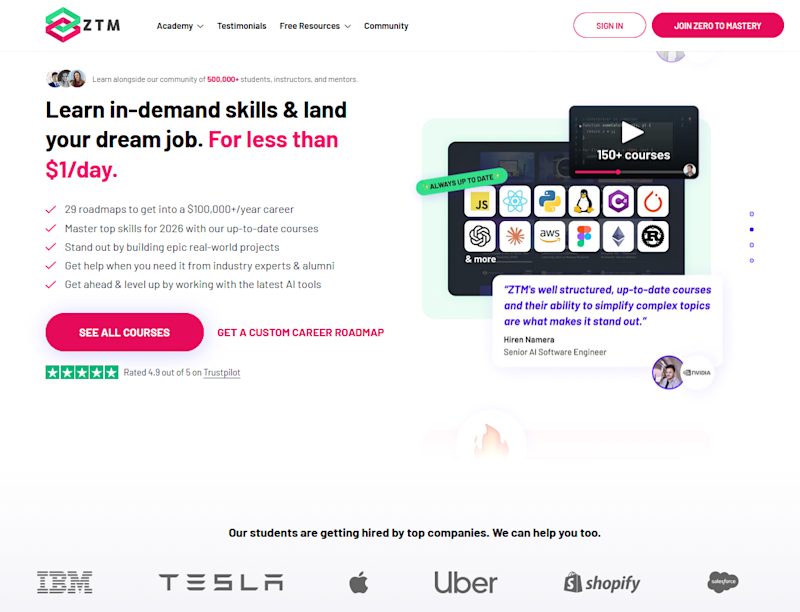
Here at Zero To Mastery, we’re a tech training platform with some slight differences from others out there.
You can read our 10 Learning Commandments to see everything that makes us unique, but we’re incredibly focused on helping you learn fast and getting hired ASAP.
We don’t have the insanely large course catalogue of other platforms, and we do this on purpose:
First off, it removes overwhelm and choice fatigue. For example, if you want to learn Cyber Security? We have one expert who teaches it. This means you don’t need to pick through 250 or 10,000 options
Secondly, this allows us to update our courses regularly - often twice a year or sooner if a major update happens. This means you’re learning everything you need to know
We currently have 37 expert instructors who focus on their specialties, teaching a total of 142+ courses.
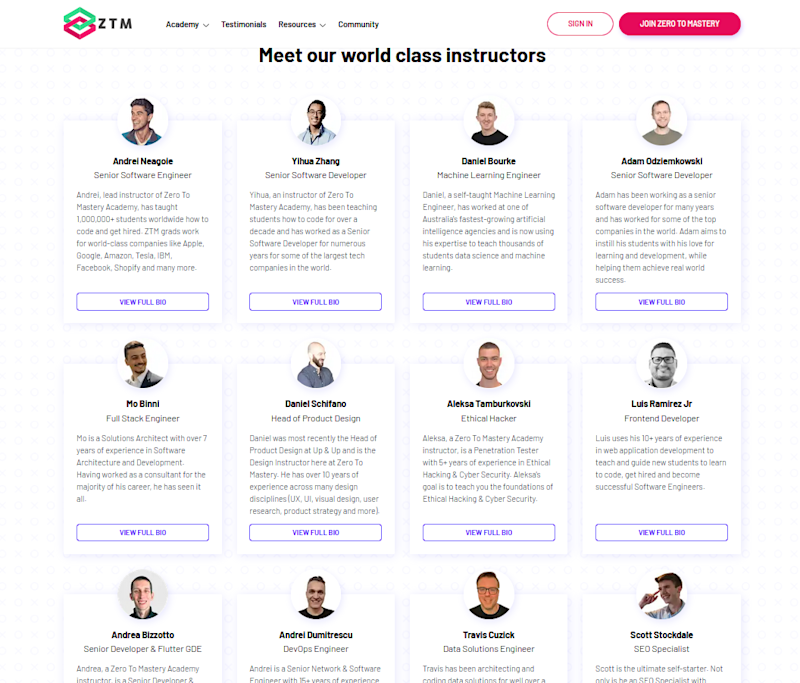
These are broken down into:
Web Development
A.I. and Machine Learning
A.I. Development/Building with A.I./Generative A.I.
Cyber Security
Cloud
DevOps
UI/UX Design
Business and Data Analysis
Web 3 and Blockchain
Life Skills
Each expert works in their field, so they are up to date with all relevant information and requirements.
Not only that, but we design our courses as if we were training up our ideal hire. We cut out all the stuff you don’t need, and give you everything to not only do the job but excel at it - including hands-on projects to create.
In fact, most employers are blown away by the level of our students. Some of them then end up training their departments at their new jobs!
This focus is also how we’ve had students go from zero experience to being hired in as little as 3 months! (Although that was one VERY eager person). The average is around 6 months or so, depending on the industry, what you need to learn, and how much time you can spend.
Either way, you’ll get it done faster here and be confident in your new role.
Can we help you get hired?
100%. Like I say, it's a huge focus for us.
Not only do we build our courses to help with this, we also give project training for your portfolio, as well as teach you how to ace each aspect of the tech interview. From the initial application to the technical questions, behavioral, and more.
It's not just that though. Even the content we teach is based around helping you get hired.
How?
Each year, we research the most trending areas to work in, and then survey our audience for topics they want to learn. Then we either create that course or bring in a new expert to the team to get it made.
This is why we not only help people get hired initially, but we also help people get promoted into more Senior roles.
We recently helped someone learn the skills they needed to land a senior position at NVIDIA, while other students are literally writing papers on Deep Learning and speaking at events.
Not bad, right?
We also have career paths and roadmaps to help you learn everything you need to know in order to get hired in a role.
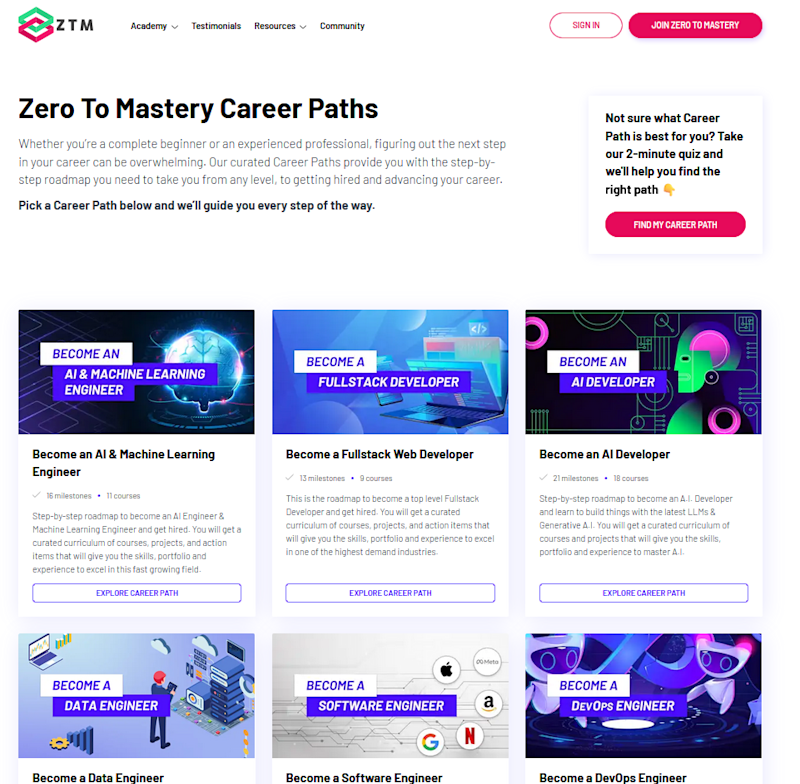
Pricing
We have 4 pricing options, as well as a deal which I GUARANTEE you’ve never seen offered before in the tech space.
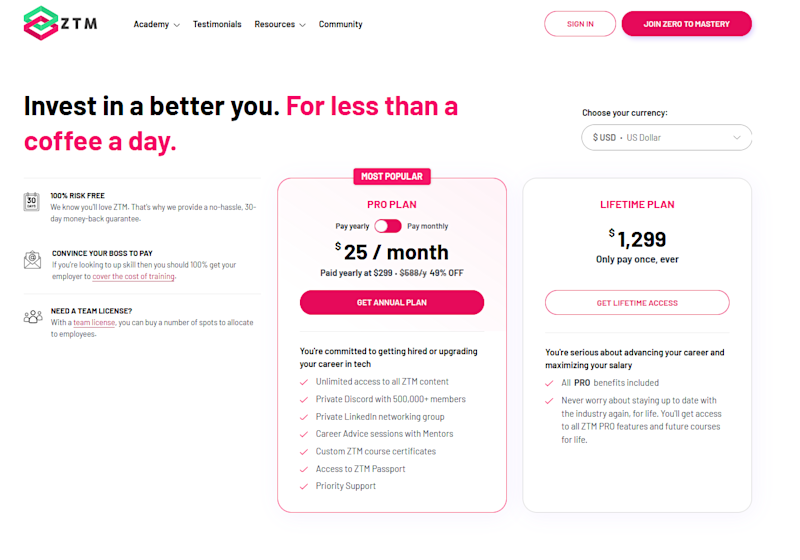
So let’s break it down:
You can purchase some of our courses individually ($99-$499)
Then we have our monthly membership at only $49 a month
Or you can join for the year at $299 and save 49% (Working out to $25 a month equivalent)
We also have a one-time purchase offer for $1,299 that gives you lifetime access to all courses now and in the future
That alone is better than most platforms, but we take it one step further by offering a unique challenge.
This is the deal I mentioned.
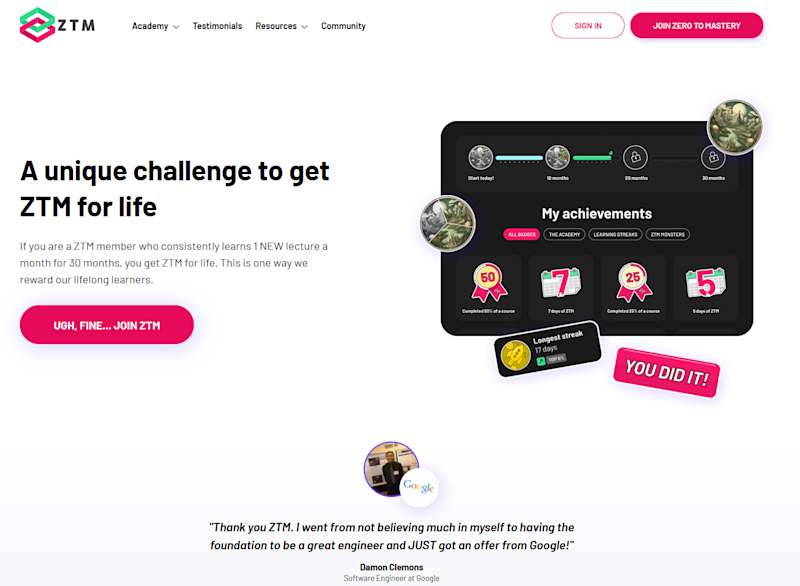
Here’s how it works:
If you log in and complete 1 lesson per month, for 30 months straight, you no longer have to pay us and get lifetime access.
That way, we can reward long-term members. More importantly, though, it incentivizes you to keep learning and not quit. Like I said, we’re all about making sure you succeed at this.
It’s why we’ve had people hired at Tesla, Google, Amazon, Facebook, and all other places.
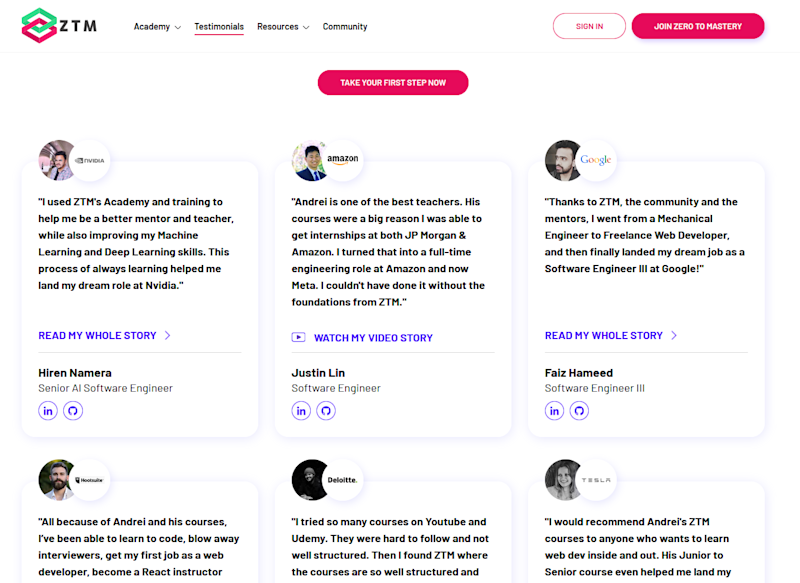
You can check out some of the testimonials here.
They’re super inspirational.
Like I said, we’ve had people hired in 3-6 months, and going from waiters to 6-figure tech salaries.
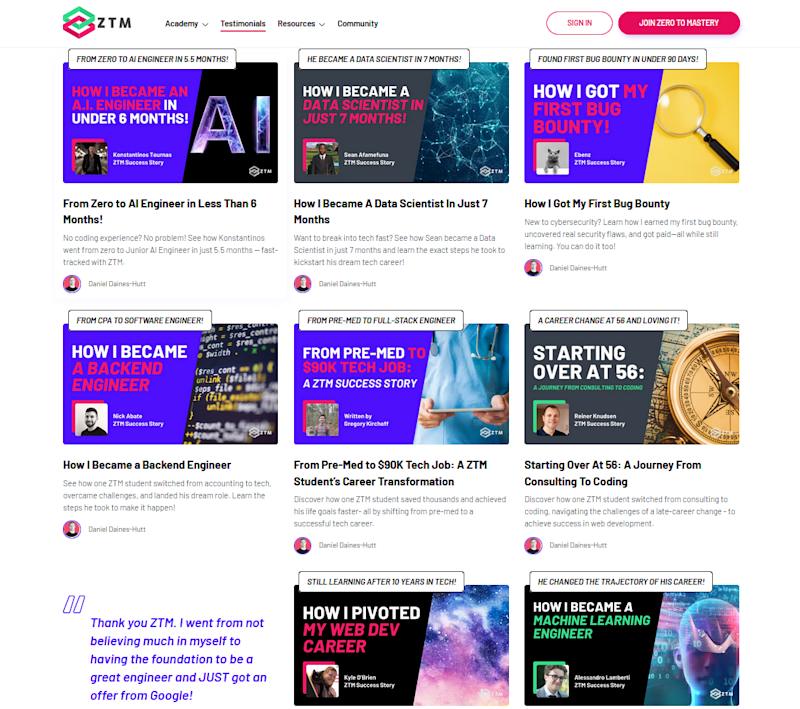
Is there a community?
Of course there is!
We have a private Discord community with private channels for each major course/industry.
This way, you can chat with the instructors, other students, create accountability buddies, and ask questions from working tech professionals in your field.
Like I’ve said already - we’re committed to providing things that will help you learn and stick to it. People are often shocked at how supportive and helpful the community is - especially after experiencing other platforms.

(And that’s just a fraction of the happy members we have here).
We also run live events, cohort sprints, private AMA calls, and more. All the benefits of boot camps or in-person events, without the price tag!
Is there customer support?
Yep. Hopefully, you never need it, but we have a genuine human being to help reply to any account issues if they happen.
We also have our experts and community support who help pass on any issues and get them sorted ASAP.
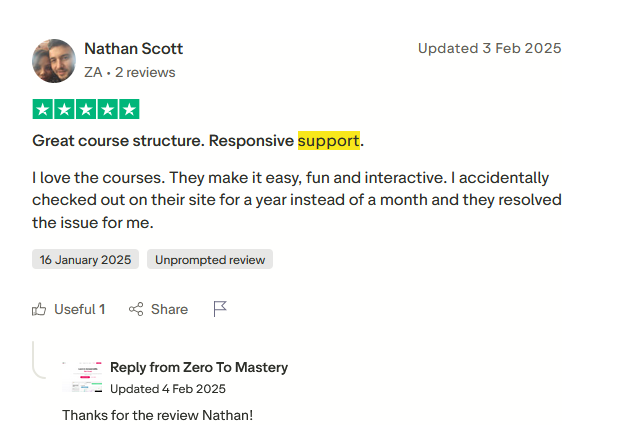
No dodgy pricing issues allowed!
Reviews + TrustPilot score
As of the time of writing (November 2025), we currently have a TrustPilot score of 4.9 out of 5, with 600 reviews.

You can check them out here for yourself.
We also have less than 1% of our reviews as negative, and every single one of them has been responded to and resolved within 24 hours.
In the interest of fairness with these other platforms, let’s take a look at those 1-star reviews.
The last one we got was 9 months ago in December 2024. As you can see, a student was annoyed that a course wasn’t up to date.
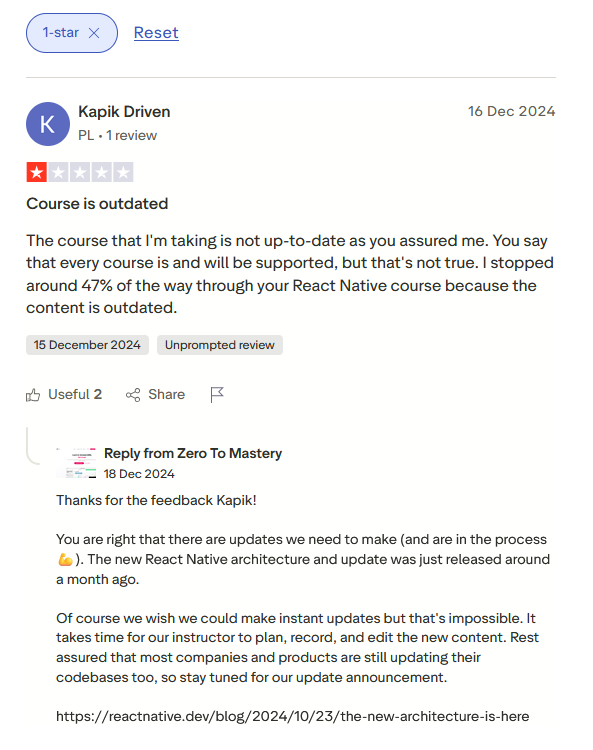
What had happened was the language had just gone through a major overhaul less than 30 days prior, and the instructor was putting together all the changes so they could update the course, and that takes time, which I think is fair.
It’s been updated multiple times since this comment for minor updates etc, but for such a sweeping change, it can take a little while to record 43 hours of videos!
That said, definitely go read the reviews so you can decide for yourself if it would be a good fit for you. Or just sign up now, and you have 30 days to try it out. If you don't love it, we'll refund you 100% no questions asked.
TL;DR
If you want to get a job in tech asap, then we believe we have everything in place to help you get there fast.
Everything that we do, we plan the best methods to help you succeed.
Pros
Reasonable price and variety of pricing options
Designed to help you get hired asap with zero prior experience
Thriving, helpful community with actual instructors, mentors, and fellow learners
Most up-to-date courses of any school we know of
Lifetime free access on completing the lifetime challenge
Cons
We don’t offer a free plan, although we have released some introductory courses over on our YouTube channel and we provide the first ~1 hour of most courses for free (no signup or credit card required)... just click any lecture that says "PREVIEW"
For example
Here’s the first 8 hours of our complete Python Developer bootcamp course:
This way, you get an idea of our courses and can get started for free!
So which should you choose? Udemy vs Coursera vs Zero To Mastery
Hopefully, this guide has helped you clear up some questions you might have about the best platform for you to learn programming, machine learning, AI, or any other tech skills.
The decision is ultimately yours, as there is no best option for everyone. You need to weigh up your own needs:
Coursera has a large tech course catalogue and the potential for college-level certifications within its select college course programs. (Although higher ticket)
Udemy is cheap but might not be updated, so make sure to do your homework. It also lacks support and has an overwhelming number of courses on the same topic
Zero To Mastery will help you learn from scratch and get hired ASAP. Everything from the way lessons are structured to the topics we choose to each, and how we teach them, is all focused on helping you become a working tech professional. You don't need to wait 4 years to get a tech career
Whichever you choose, the key thing is to just make sure you take action and choose one of these platforms today so that you can get started on that new job and skill.
You’ll be surprised how quickly you can get into that 6-figure career.
Best articles. Best resources. Only for ZTM subscribers.
If you enjoyed this post and want to get more like it in the future, subscribe below. By joining the ZTM community of over 100,000 developers you’ll receive Web Developer Monthly (the fastest growing monthly newsletter for developers) and other exclusive ZTM posts, opportunities and offers.
No spam ever, unsubscribe anytime













